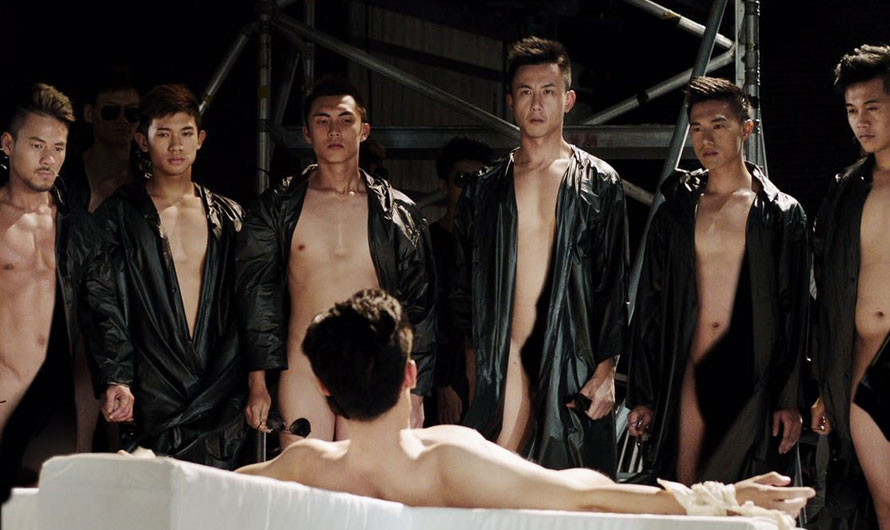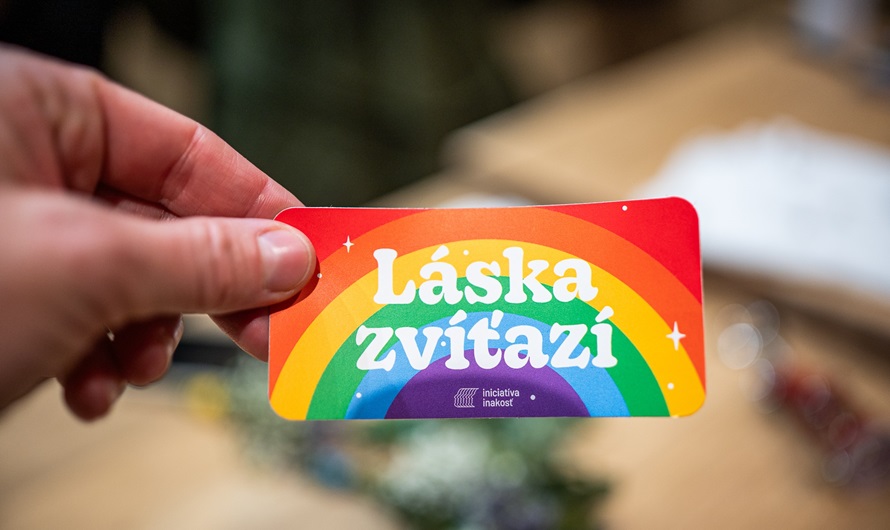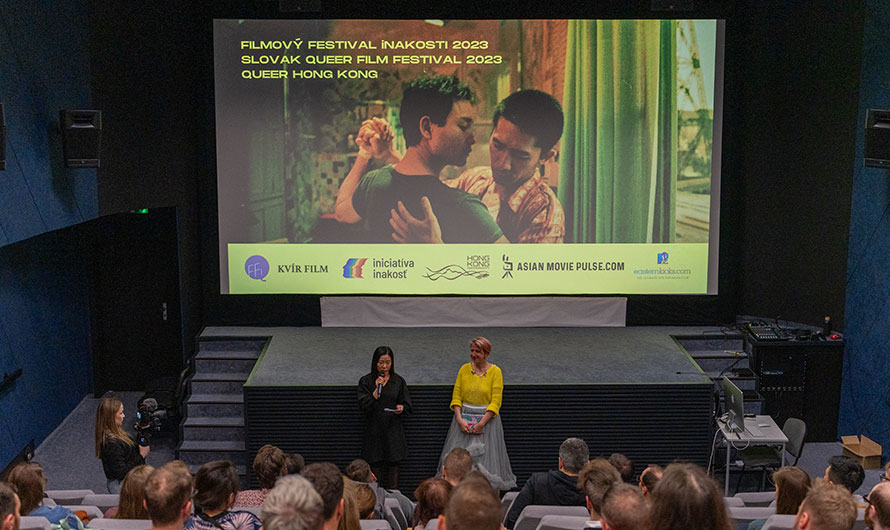
Almodóvar, Cher and Kronerová: 17th Slovak Queer Film Festival announces programme details
In just one more month, the Slovak Queer Film Festival kicks off, held from 22 to 28 November 2023. Its 17th edition will be one of the biggest in the festival’s history, featuring numerous new additions, award-winning films and unforgettable cult classics.
In the spirit of this year’s slogan, “Our differences connect us”, the event’s organizers Iniciatíva Inakosť and Kvír Film have connected various single-screen cinemas in Bratislava’s wider centre. And so for the first time, the festival will be held at as many as five different places: the Slovak National Gallery (Kino Lumière x SNG), the FTF VŠMU (the Film and Television Faculty at the Academy of Performing Arts) cinema, and at the cinemas Mladosť, Nostalgia and Film Europe. “We’re delighted that all the venues were willing to give space to our genre- and theme-spanning rainbow film programme. Thanks to them, we’ll be screening more than 30 feature-length films and over 40 shorts,” explained festival director Zita Hosszúová at today’s press conference in the Falkensteiner Hotel.
The queer film marathon is also backed by actress Zuzana Kronerová, who stated, “I support the Slovak Queer Film Festival, being a proud patron of the event since the very beginning (2009). Since the first edition, the festival has stood out for its high quality. Its team of organizers is made up of professional film programmers led by festival director Zita Hosszúová. And why, some may ask, have I supported the queer community for so long and will I continue to do so? Because in our country, LGBTI+ people still don’t enjoy the same rights as the rest of our society, not to mention the savage attacks on them by some other citizens of our country. May this first anniversary of Juraj and Matúš’s tragic deaths serve as a stern reminder,” she emphasized. Distinguished actor Richard Stanke, also a patron of the festival, holds a similar view: “Tolerance, mutual respect and – what is so important in these times – dialogue: without these attributes, the modern society we want to be a part of wouldn’t be possible. And the Slovak Queer Film Festival is one of the possibilities and means of achieving that…” he explained.
Every year, the Classics section highlights outstanding works of world cinema that involve LGBTI+ themes. This time around, it includes major figures of international film. Jeremy Irons, for example, excels in M. Butterfly (1993), David Cronenberg’s melodrama about love, obsession and manipulation. Meryl Streep meets Cher in Mike Nichols’s film Silkwood (1983), which was inspired by actual events, namely an unnamed nuclear power plant’s insufficient protection of its employees from radiation. Nichols seamlessly weaves this important environmental subject into the fabric of everyday life, where suspicion of grave workplace health risks intertwines with a story of friendship and unrequited lesbian love. Antonio Banderas, alongside other longtime collaborators with Spanish director Pedro Almodóvar, stars in Law of Desire (La ley del deseo, 1987), a turbulent, effervescent film about passion and bizarre family relationships.
“For this year’s festival, it was important to me to make sure the Contemporary Film section included movies about transgender people that don’t just focus on their transition, but depict them as complex characters. Also, trans men get very little representation in the media, and this is one reason why the film Mutt (2023) is so important,” stated section programmer David Benedek. Directed by Vuk Lungulov-Klotz, the film centres on a protagonist trying to navigate the new dynamics of old relationships while tackling the day-to-day challenges that come with living a life in between. The film was screened at the Berlinale and Sundance in 2023.
David Benedek also pointed out the significant film 1946: The Mistranslation That Shifted Culture, directed by Sharon Roggio. “This feature-length documentary is about tireless researchers who, in search of the root of homophobia among Christians, end up discovering a serious error in a 1946 translation of the Bible,” he explained. The film recounts the discovery of previously unknown documents in the Yale University archives which lead to revelations that cast serious doubt on there being any biblical basis for prejudice against LGBTI+ people. The film includes statements from prominent scholars, the opposing views of clergy, as well as the personal stories of the filmmakers themselves. While other documentaries have identified the pathological symptoms of homophobia in the church, this one tries to diagnose and treat the illness that is known as “biblical literalism”.
According to the section programmer, another film definitely worth mentioning is Queendom (d. Agniia Galdanova, 2023): “The film takes place in Russia, where it’s very dangerous to be queer. The story plays out over the backdrop of the start of the war with Ukraine, which the protagonist protests against.” Gena, an artist from a small town in Russia, dresses in otherworldly costumes and protests on the streets of Moscow. She stages radical performances in public, which becomes a new form of art and activism and puts her life in danger. The film was screened at the 2023 Outfest LA.
American independent film and New Queer Cinema are represented by Gregg Araki’s cult classic Totally F***ed Up! (1993), about lost queer youth in the 1990s. Landing somewhere between the sections Queer Czechoslovakia and Classics, the Czech-German-French coproduction The Country Teacher (2008) from Bohdan Sláma stars Pavel Liška, who excels as a gay teacher searching for peace and reconciliation. Slovak Queer Film Festival patron Zuzana Kronerová also plays a supporting role in the film.
What’s more, the festival programme includes the award-winning, six-Oscar-nominated film Tár (d. Todd Field, 2022), starring Cate Blanchett. The film deals with themes of cancel culture, manipulation, insensitivity and genius in the art world. Tár tells the story of an established, world-renowned conductor; Days of Happiness (Les jours heureux, 2023), on the other hand, follows a promising conductor at the start of her career, as she tries to make it in the world of great artists while also dealing with her own personal issues – a complicated relationship with her father and a secret romance with her girlfriend.
In this year’s programme, Asian cinema is represented by the section Queer Hong Kong, which will open with a digitally restored version of Wong Kar-wai’s classic Happy Together (Chun gwong cha sit, 1997), winner of Best Director at Cannes 1997 and starring Tony Leung a Lesley Cheung, a Hong Kong queer icon. Aside from this film about lovers looking for happiness in Argentina, the section will also include the lesbian cult classic Butterfly (Hu die, 2004) from director Yan Yan Mak, whose brave ideas are still relevant today. In the light comedy Love Me Not (2011), director Gilitte Leung focuses on the friendship between lesbian Aggie and gay Dennis. From the controversial director Scud, Thirty Years of Adonis (2017) is a provocative, sensual film about love, sex, life and death. And in Tracey (2018), Jun Li offers a sensitive discussion of transsexuality, which in Hong Kong cinema is rarely presented as anything other than an object of ridicule. The section Queer Hong Kong is financially supported by the Hong Kong Economic and Trade Office in Berlin and selected by film programmer Kristína Aschenbrennerová.
The team of organizers have also taken little filmgoers into account. The festival’s children’s section, in cooperation with the Association of Slovak Film Clubs, will include a workshop for children between six and eight years old entitled Film Lab for Kids, an interactive event that playfully reveals the mysteries and fundamentals of cinematic storytelling.
The new additions to the festival include a three-strong international jury for the short film competition section, made up of screenwriter, author and Fest Anča programme director Jakub Spevák, director of the Mezipatra Queer Film Festival Pavel Bicek, and Bulgarian actress and short film director Slava Doycheva.
Iniciatíva Inakosť is organizing the annual event inKonferencia, a conference focused on the rights and standing of LGBTI+ people, which will be part of the Slovak Queer Film Festival for the first time. “The conference will include three panel discussions. The first will focus on business and marketing, where we will discuss the reasons and need for companies to incorporate LGBTI+ topics into their public-facing activities as well as their internal company culture. The second discussion will look at LGBTI+ topics in the media and the audiovisual sphere,” explained Roman Samotný from Iniciatíva Inakosť, adding: “The third and final discussion will be oriented toward civil- and public-sector activities related to LGBTI+ rights.”
Festival permanent passes (cinepasses) are available for purchase at www.cinepass.sk/ffi.
The festival receives financial support from Slovakia’s Audiovisual Fund.
Organized with the financial support of the Ministry of Culture of the Slovak Republic.
Major partners: Hong Kong Economic and Trade Office in Berlin, Férová nadácia, US Embassy in Slovakia, Poisťovňa NN, DHL, Hotel Clarion and CzechTourism Slovakia.
Partners: Kino Lumière x SNG, Kino Mladosť, Kino Nostalgia Nivy, Kino Film Europe, FTF VŠMU, Istituto Italiano di Cultura, NO CAP, MyCinepass, Bratislava – Staré Mesto and Edisonline.



